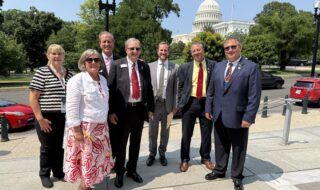Topics:
July 19, 2022
Senate Bill 131 and House Bill 203 require recognition of licenses from other states if they meet Ohio standards
Licensure Reform Can Put More Ohioans to Work
State:
Get to know NFIB
NFIB is a member-driven organization advocating on behalf of small and independent businesses nationwide.
Related Articles

June 30, 2025
Ohio Small Business Owners Visit with Lawmakers at D.C. Fly-In
NFIB’s annual event gives members a chance to engage directly with lawmak…
Read More


June 25, 2025
Ohio Legislative Update: Summer 2025
Learn about NFIB’s testimony on important legislation being considered
Read More


June 24, 2025
NFIB Wisconsin Applauds Passage of Workforce Recruitment Grants
Wisconsin State Budget will contain tax relief for small businesses
Read More


June 18, 2025
NFIB Launches S.C. Ad Campaign to Repeal Unconstitutional Small…
If not fully repealed, 32 million small businesses nationwide could once ag…
Read More







